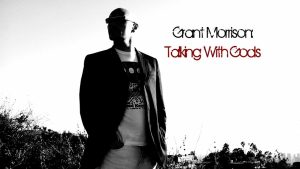
Patrick, thanks for talking with me about the film. I’ve watched it a few times since it came out almost ten years ago and it’s a really unique project. To start off, could you describe the documentary for someone who hasn’t watched it before?
Sure. Grant Morrison: Talking with Gods is a feature length documentary about the life and work of Grant Morrison. One of the biggest comic book writers, I think, in comic book history. He’s kind of the rock star or “bad boy” of comics, sort of a psychedelic shaman for the modern age. The film basically tracks his life and how he has integrated the events of his life into his work. So it’s about both his life and his work and the many, many areas where they intersect.
Before we talk about Grant and his work, tell us what’s going on with the film. What are you doing with it now, and what audience is it geared towards?
Well the movie has been out for a while now — we finished it back in 2010 — and we’re making it available now on YouTube for free, so that pretty much anybody anywhere in the world can just queue it up and watch it whenever they want. And the main reason for this is that our original distribution contract ran out. The film went on Hulu for a while and it was widely available there and then that contract expired. So it was sort of in limbo. And I was thinking that I want people to be able to watch the movie and I want people to be able to see it in the easiest way possible, and it felt like just making it available was the best way to do that. I think the goal is to reach new viewers. People who might have come to Grant’s work more recently, people who maybe aren’t that into comics but some of the other stuff that Grant is about. And to make it easy to see so that if you want to watch it you can go watch it.
What led you to want to make the documentary in the first place?
For me personally Grant’s work was an amazing inspiration, like it is for a lot of people. Growing up I had always been into movies and then I got into comics and I always sort of loved weird stuff, kind of psychedelic type stuff. But I had never seen anybody who synthesized it all together as well as Grant did. And then reading about him in high school and college I got to know his work better. And I discovered that his real life is just as interesting as his comics, and I was interested in learning more and knowing more about him. At the time, YouTube was just starting out and there wasn’t a lot of good video of Grant. It was very hard to actually see him talk about the stuff that he was into. So I thought this would be a great opportunity to do a documentary that brings all these things and the story of his life together for posterity and capture this moment in his life for people. At the time I had just graduated from college recently and was starting out in the film industry. The big thing that led me to doing the project was that I wrote a whole bunch of blogs about every issue of The Invisibles. And that’s when I got the attention of Sequart which is an organization that publishes books about comics and explores the deeper meaning of what’s going on in comics. So they liked my stuff and they said why don’t we turn this into a book? They had done a book about Grant previously called Grant Morrison: The Early Years. And I thought if we’re going to interview him why not pitch the concept of doing a documentary on him? And so we e-mailed him and he said okay let’s do it. It was as easy as that and it was very exciting. I had never done a documentary before, but I just tried to make the movie I’d want to watch and tackle the topics I’d want to see. To make something that would be just as exciting for people who are big fans who had read every interview with him, but also accessible to people who don’t know him and want to find out more.
And it wasn’t just Grant. You interview an impressive number of creators and industry professionals in the film as well.
We were very fortunate because Grant is such a big name in the industry, and when people saw that he was putting his time into the project they thought that they’d like to be a part of it too. So it really opened the doors there because people would ask “Is Grant involved?” and when we told them that yes, we filmed with him at his house and filmed with him elsewhere, they felt happy to be a part of it. I went a little bit crazy trying to get every person we could think of — every artist who’d worked with Grant, people he knew, people he had collaborated with in other ways. We got a really nice selection of different people from across his life. We had a childhood friend named Gordy Goudie who is now in Echo & the Bunnymen who knew Grant growing up and gave us great insight into Grant and his family. And then we had Karen Berger who sort of brought him into American comics. We had a lot of the artists he worked with like Phil Jimenez or Cameron Stewart, or Frank Quitely who I think is probably his most famous collaborative relationship. And it was really cool to have some other people who were more on the philosophical or analytical side like Douglas Rushkoff or Richard Metzger of Disinformation. I was very excited that we interviewed Amber Benson, who I always liked from Buffy and I knew she was a fan and she was nice enough to interview with us. So it was really fun as somebody who’s read so many Grant books to get to talk to people who drew them and ask them things like: what was the story behind this and what was it like working from Grant’s scripts? These are the insights you wouldn’t necessarily get without talking to these people directly.
Your documentary opens with thunderous applause for Grant as he is announced at Comic-Con, something that still happens today. You said he’s the rock star of comics. What makes him so exciting that people react so strongly to his presence?
Well I think you’re definitely right, he’s still one of the biggest names and one of the few people where, when they announce a book with him and he’s doing a new take on one of these classic superhero characters or his own book, people are always excited about it. I think it comes down to what the film talks about, which is that he puts so much of himself into the comics. I think there’s a lot of great comic book writers who have done fantastic work but you don’t necessarily feel like you want to know about them. You don’t necessarily feel like you would love to sit down and understand this guy’s point of view on the world, understand where he came from, understand why he’s telling the stories he is. I think Grant is very unique in that, even in the big corporate superhero books he does, he still makes them feel like his. As I.P.-based storytelling has spread more and more into movies and TV, there’s a real difference between somebody who is able to make a concept that already existed into something of their own and that feels personal for them versus someone who’s just saying “Oh I loved watching whatever show as a kid, let me just make something that kind of tries to recapture what I liked as a kid”. He brings something so personal. Even something like All Star Superman, he talks a lot in the movie about how this was about his experience with his father and his experiences growing up and things that he’s been through. And I think you can tell it’s something that comes from the heart.
One of the things that comes through in the film very well is that Grant takes comics so seriously. He’s very lighthearted and playful, but to him comics is obviously this serious intellectual topic. He says in the movie that comics are “one of the last great ideas we have”. Do you think comics are important like that?
For me what’s so exciting about comics, and the reason that it seems that literally everything is now based on a comic, is that it was this very experimental place to bring new ideas and just try different things. And even in the most mainstream of books, like a lot of the big DC crossovers such as Crisis on Infinite Earths…it’s about multiverse theory and there’s so many crazy different iterations of all these characters and just so many different ideas. And that’s what’s great about comics and that’s why Grant is very well suited. Going back to Jack Kirby, it’s all about these crazy ideas and exciting concepts and kind of being a lab for stuff that then filters out into the mainstream culture. And I think it’s a way to get a little bit of weirder, newer ideas out there. And as we’ve seen more and more adaptations of shows and movies and things, it’s clear that comics have something new that people want to bring into different arenas that are more popular or widely watched.
Which of Grant’s works do you think get across his underlying message and themes the best? You did write a book about The Invisibles…is that the perfect Morrison comic?
I think the two biggest things he’s done, and you can tell from the film how personal each of them were, are The Invisibles and Flex Mentallo. Flex Mentallo is kind of a thesis about why he loves superhero comics and the power of superhero comics, not just as an escape but as something that can help people in the real world. I wasn’t really aware of this before talking to him, but after the stuff you see in the movie, it’s clear that a lot of things in Flex Mentallo that might seem like non sequiturs if you just read it are very autobiographical. It’s very much him saying that this is how comics saved my life or helped make me into the person I am today, and this is why they matter. And I think in the past 20 years or so since the series came out, all the superhero comics he’s written are kind of riffing on this concept of the superhero as a figure that can help people in the real world or as an aspirational figure or a new mythos for us to engage with and aspire to. And I think The Invisibles is very much about his personal philosophy about the world. It encompasses everything from four dimensional views of time to cool fashions and music and all the things that he was into at the time. And it’s still so relevant. In my book, Our Sentence is Up, I talked a lot about how I felt like it related to what was going on in the 2000’s and the George Bush years. I think that as you look at our world today, people talk about fake news and creating their own reality and becoming more and more divided. You can find a lot of parallels to what was going on there and maybe in the series you could find some solutions as well.
The Invisibles is such a powerful and transformational book for people. It struck me in a big way — I have two tattoos and they’re both Invisibles pages. Can you share anything personal about what reading The Invisibles, either the first time or the tenth time or whatever, has done for you and your life?
The big thing for me was that I’d always wanted to go into film and writing and creating stories, but I kind of viewed it as an escape like I think a lot of people do. You have a notion that there’s the real world and then there’s the fictional world. And I think the thing that The Invisibles does so well is show that fiction can make a huge impact on our world and on our lives. That a piece of fiction can make more of an impact than anything that somebody does in the real world. This is something Grant has said before, that Superman is still alive. He continues to live on and he’s probably going to live on for 100 more years. Most of the people who were alive when Superman was created are gone and forgotten. So it’s always more real. What is the thing that has more impact? So I think it just makes you really see how powerful fiction can be and what impact somebody who is creative can make on the world. So that was a big part of me saying that I want to take the risk and challenge of going into this field and trying to create stuff and do my own projects.
Another fascinating thing that comes out in the film is the idea of magic. Grant talks a lot about magic and brings these concepts into his work. Have you ever tried out any of Grant’s magical suggestions or dabbled in the practical applications of the magic in his comics?
No, not too much, but I think that the act of making this movie was a kind of magical act in that sense. What I love about his concept is that it’s really about what works. He’s not telling you “Have faith in this”. It’s a much more experimental thing. So I think that the act of engaging with the series so much and writing all this stuff was kind of a magical act, the ability to do this documentary and to go on this journey from there. I’ve seen documentaries that are like “The universe is all connected and we’re all one and time is whatever” and if it’s them telling you, I feel like it doesn’t work. But to say here’s some stuff this guy did, see what happens. Believe in the way that he did, look at fiction in the way he did, look at reality in the way he did. See how it changes things for you. I think it definitely changed things for me personally, and the movie ends on this note of him saying “Give it a shot, who knows what will happen?” He’s not telling you what to do. He’s saying it’s up to you to decide.
He says “life plus significance equals magic”. I think probably just seeing Grant and the way he interacts with the world is the best testament to this philosophy. He’s so happy — almost giddy with excitement when he talks about comics.
Well one of the things that is interesting about talking with Grant is that he could talk so extensively and explore the meaning of anything. With comics, what about this Silver Age Batman where he dressed up in this crazy outfit? Or it’s crazy that Drumpf is president and that this or that is happening, what’s that about? And I think he could talk as eloquently about each or bring a new perspective to each of those things. And I think it’s cool because there’s a lot of people who can talk about comics and they can talk about minutia of continuity, and then there’s a lot of people who can talk about what’s going on in the world. But I think that Grant brings the same unique perspective and analytical mindset to exploring both sides of things. And I guess that’s what makes his work so good. There’s no separation.
So this was your first documentary, but you’ve also gone on to create other documentary films about other comics creators, like Neil Gaiman, Warren Ellis and others. Did you find any common themes between these iconic creators that you’re interviewing?
I think for Warren and Neil and Grant it’s interesting because they all got into the medium very young and they’re all kind of known for being very learned and intellectual, but I don’t think any of them went to college. And they all grew up in the same pre-Thatcher era of Britain. It wasn’t a great time from everything I’ve heard from talking to the people who grew up in that time and it’s interesting they all sort of came out of this world. And I think for each of them, there was a sense of wanting to take advantage of the possibility of a medium that had never been used to its full extent. Alan Moore was obviously a pioneer in doing that and kind of opened the door and I think these were people who all went through after. For Neil it was comics that were very literary and drew on myths and drew on history, like Sandman. I think for Grant it was taking the art world he was growing up in at the time and his interest in metafiction and the nature of what continuity is for comics. Exploring what does it mean to have a story that stretches for 50 years, how does that sustain itself? I think Warren was less interested in superheroes and things like that, but it was only possible because of people like Alan Moore who showed that comics could be more than superheroes. So I think there’s a common thread there. They kind of grew up in a working class. It’s interesting that they are so intellectual and so sophisticated when you wouldn’t necessarily associate or expect that.
Is there anyone involved with the film that you’d like to call out?
I definitely want to thank Mike Phillips and Julian Darius of Sequart who kicked this whole thing off by publishing these books in the first place and approaching comics in this way where it was something to think about. Jordan Rennert worked with me throughout. Amber Yoder was the other producer and we had a great time traveling to Scotland and California. I’d never been to California or Europe before, so it was pretty exciting to go on this journey to all these different places to film the movie and see Grant and see the world he grew up in and the world he was living in.
To wrap up, what do you hope this film accomplishes, now that it will be reaching a wider audience?
What I hope it accomplishes is to keep getting Grant’s ideas about the world out there. My goal with the movie was to make something like a primer to his view on the world, a primer to his work. And if you watch it and you haven’t read his work hopefully you say “Oh this sounds cool, I want to go check it out and learn more.” For me it was so cool to hear about these ideas and get to view fiction in a different way and kind of look at the meaning of what was going on. Things like The Invisibles’ view of time, with the model of 4D time, is something I think about all the time and it really informed my view of the world. So giving people the chance to hear someone who has a unique perspective and understand it and maybe change the way that they view the world would be pretty cool.
Starting today, Grant Morrison: Talking with Gods is available for free on YouTube. You can watch the entire film right now by clicking here!


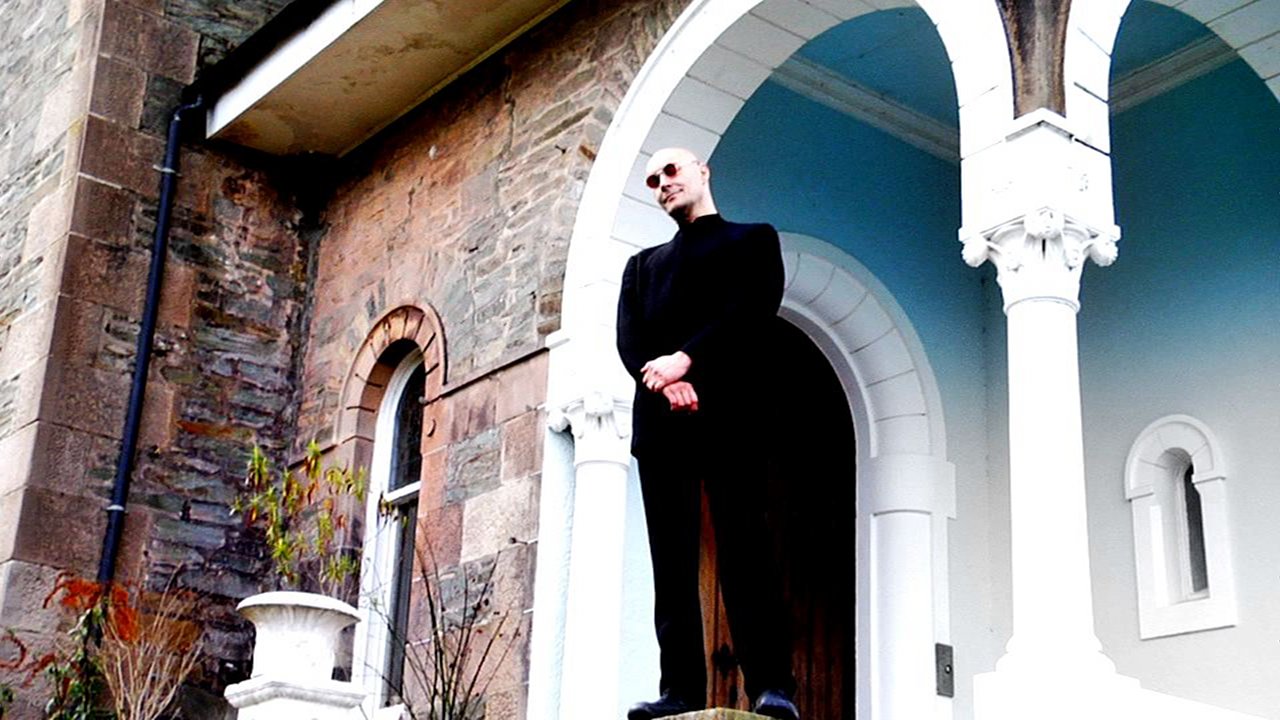
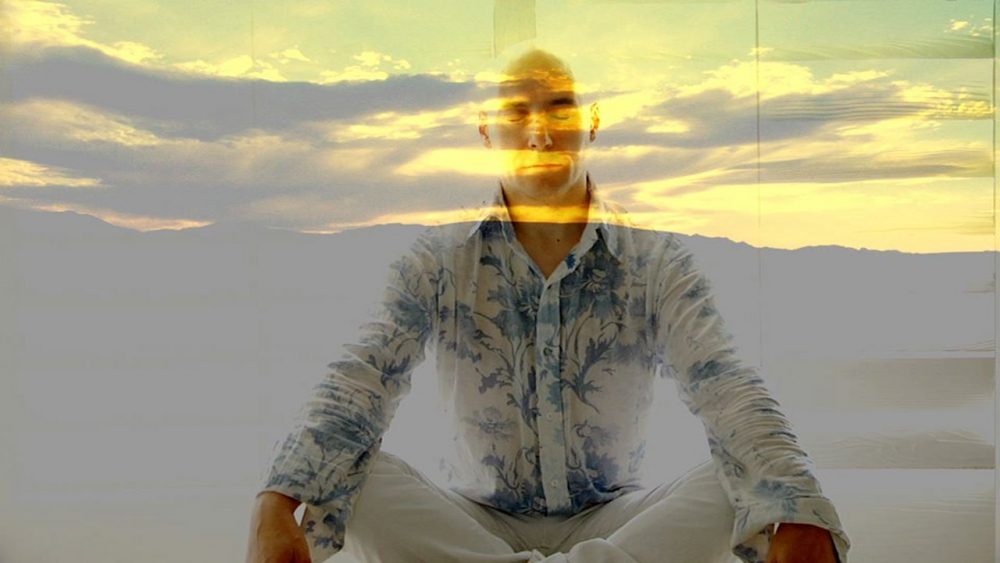
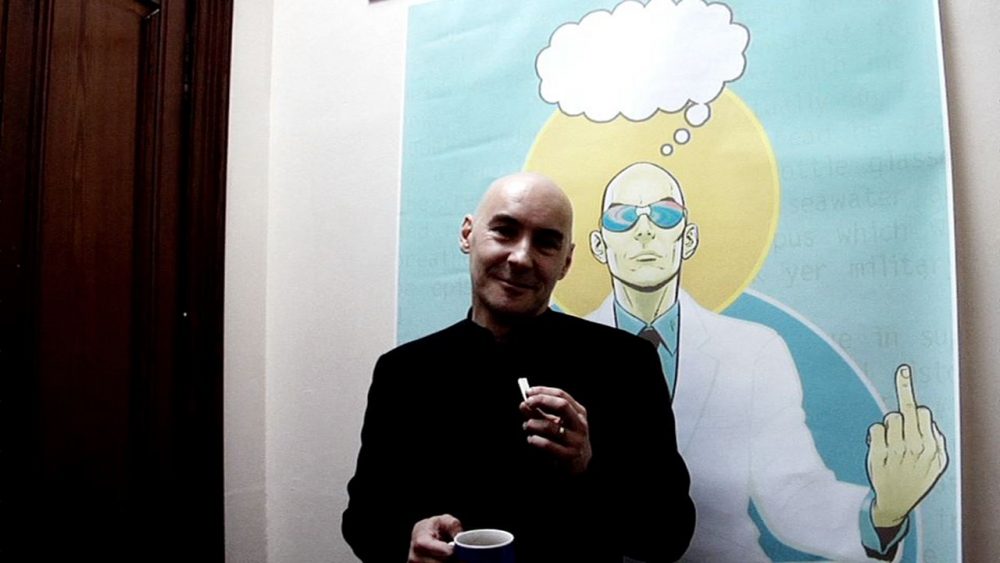
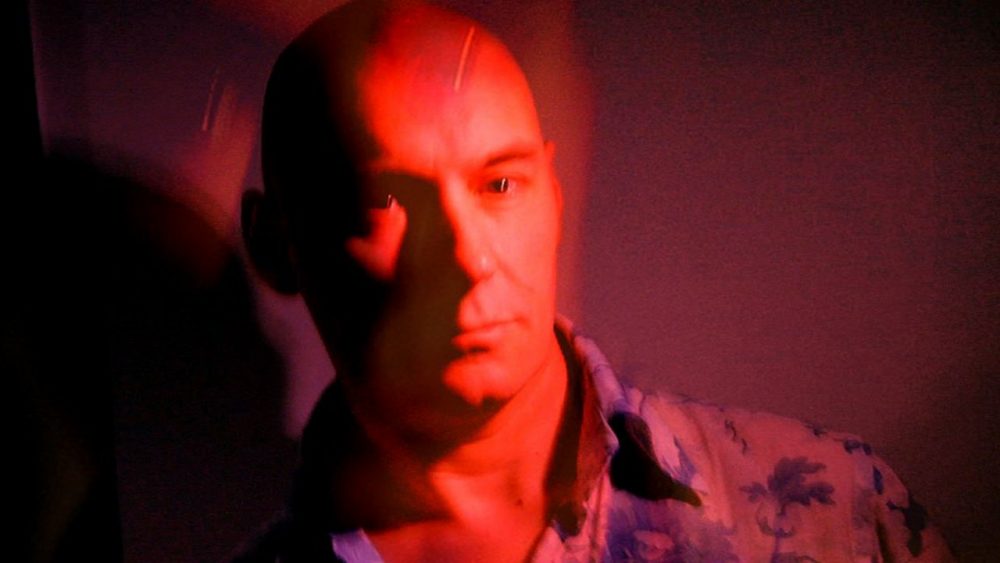

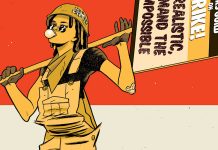




Check out this interview with Grant Morrison on Amazon http://a.co/6639nJk
Comments are closed.